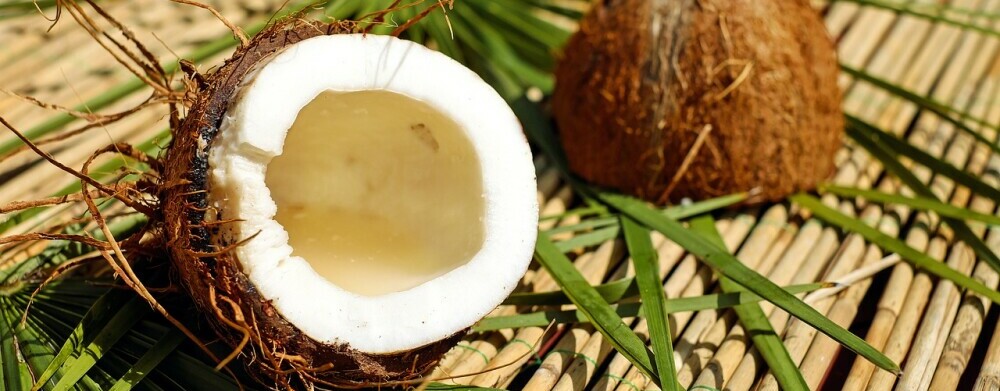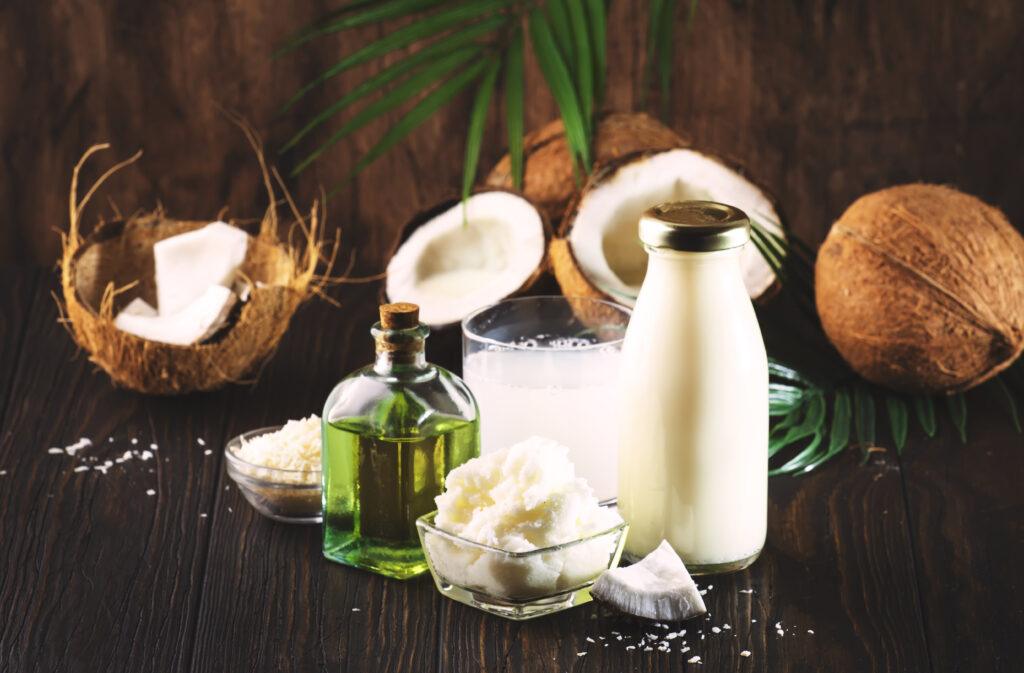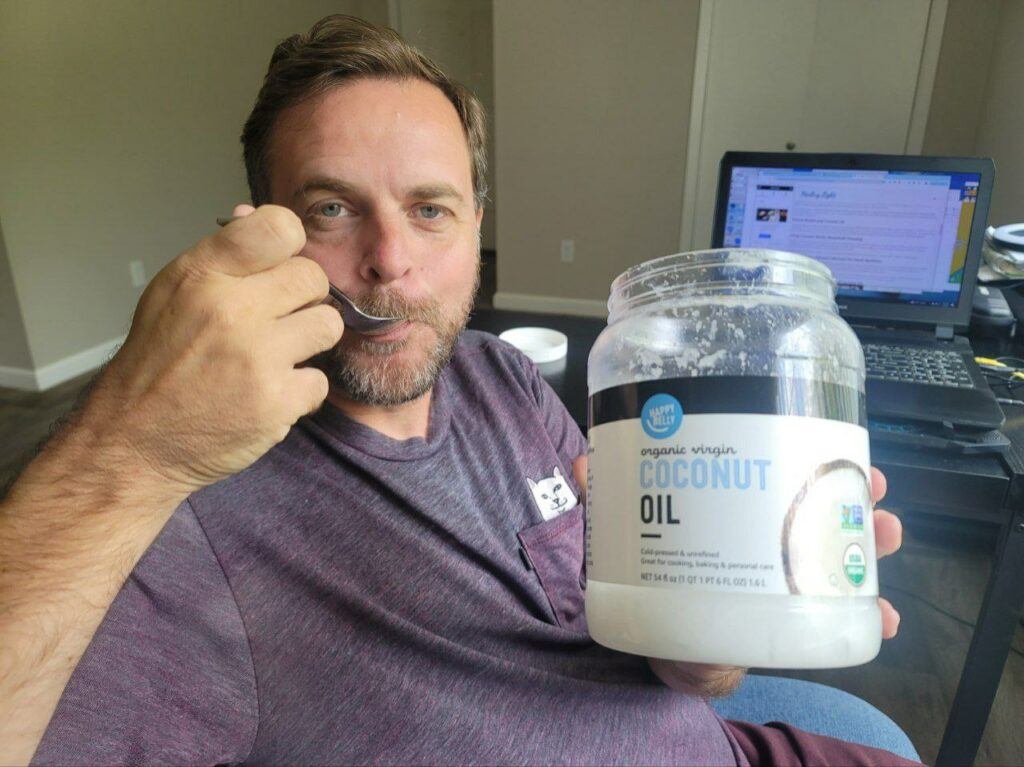
There is a lot hidden inside the hard shell of a coconut. This article goes beyond the replenishing water and yummy meat that you find when you cut one open. And if you are dealing with a chronic health issue, you may have been looking into holistic or alternative ways to heal. That search is inevitably going to lead you to the coconut and the potent oils they contain offering a long list of purported health benefits.
I use coconut oil daily and it has been a cornerstone of my healing journey from being overweight and severely depressed to enjoying the best shape of my life as I pursue my life’s mission with passion. Please note that there are affiliate links in this article as affiliate marketing is a way that you can support our mission of gridwork and offering healing to those in need, and it doesn’t cost you anything more than it would by going directly to the store.
To this day I am still discovering new uses for this amazing oil. Let’s explore these many uses of coconut oil, starting with the secrets that are contained in the oil.
Nutritional Composition of Coconut Oil
Coconut oil is a treasure-trove of healthy fats, primarily composed of medium-chain triglycerides (MCTs). These MCTs are lauded for their unique metabolic pathway—how they are absorbed and utilized by the body—which sets coconut oil apart from its counterparts. Rich in lauric acid, which constitutes about 50% of its fatty acid content, coconut oil also contains caprylic acid and capric acid, both known for their antimicrobial and antioxidant characteristics.
The MCTs enhance energy expenditure and could even spark increased calorie burning to aid in weight loss. Medium chain triglycerides increase the production of ketones which can be an alternative energy source for the brain, which may be why coconut oil can lead to improved cognitive function and memory recall. It has also been shown to improve blood sugar control.
Lauric acid has many additional benefits listed including improved digestive health as it promotes the growth of beneficial bacteria in the gut while reducing the growth of harmful bacteria. It’s anti-inflammatory properties can help to soothe and protect your skin and hair, possibly even reducing the look of fine lines and wrinkles. It is a versatile compound with a range of potential health benefits.
With its rich lauric acid content, coconut oil has serious immunity-boosting potential. It is known to transform into monolaurin in the body—a compound that protects our immune system against pathogens. Before I began my healing journey I also constantly became ill with a cold, flu or bronchitis 2 to 3 times a year if not more. That decreased shortly after I began using coconut oil and for the past 9 years I haven’t even caught a cold once. I do a lot more for my health than just take coconut oil, so it doesn’t get all of the credit for keeping me health, but I feel it has been a solid contributor.
Alternative Healing Properties
Coconut oil is embraced in energy healing circles for its purported vibrational healing properties. As a natural substance believed to carry a high energetic frequency, it may bring harmony and balance within the body, offering a complementary tool for those on a path to spiritual and physical wellness. We often add coconut oil to our ceremonial cacao drink to add to the resonance.
When touting the virtues of coconut oil, it is important to address potential drawbacks and limitations. It is critical to consider individual health conditions when determining what to use and how to use it. Ultimately, you are the only one that receives the consequences of what you choose to consume, so ensure that you feel comfortable with your decisions.
I have been using it for a long time and have not noticed any adverse effects other than it feeling a little heavy in my stomach after consuming a meal that was prepared with a few Tablespoons of coconut oil. I also use it for things other than nutrition. Let’s take a look at some of those.

Beyond Nutrition: The Versatility of Coconut Oil
It’s clear that its benefits of coconut oil stretch far beyond its nutritional content. This versatile oil can aid with personal care, household utility, and even mechanical maintenance. In this section, we’ll journey through the multifaceted uses of coconut oil that enhance its reputation beyond the kitchen.
Coconut Oil in Skincare Routines
Coconut oil is a staple in skincare regimens across various cultures. Its unique composition enables it to serve as a moisturizer, which when applied topically, can aid in restoring the skin’s lipid barrier, promoting hydration, and reducing the appearance of fine lines. Furthermore, its emollient properties can offer soothing to dry and irritated skin. The inherent antimicrobial qualities bestowed by lauric acid also lend a hand in skin protection, offering a gentle guard against the environmental pollutants and microbes we encounter daily.
I often use coconut oil as a carrier oil to apply essential oils on my body, whether it be for bug bites, aches, or deodorant. I do use other carrier oils as well, but I find myself turning to this one more often than not. I really enjoy how my skin feels when I use it.
The Role of Coconut Oil in Hair Care
In the domain of hair care, and you’ll find coconut oil to be a cherished ally. A time-honored tradition in many cultures, applying coconut oil to hair can bestow a lustrous sheen, deeply condition the scalp, and help to prevent protein loss from hair strands.
Many people praise its ability to detangle and protect, offering a natural alternative to commercial hair products laden with questionable chemicals. Other than for essential oils, we use the same coconut oil for everything else. With our hair we simply massage in a big spoonful and allow it to condition for a few hours before rinsing it out.
Dental Health and Coconut Oil
As I delved deeper into alternative healing, I discovered the ancient ayurvedic technique of oil pulling. It is said to improve oral hygiene. To do this we swish a tablespoon of coconut oil in our mouths for 20 minutes and then spit it out in the trash making sure not to put it down any drain as it can clog up plumbing.
It is said that oil pulling draws out toxins and bacteria. This may contribute to reducing plaque buildup, battling gum dis-ease, and whitening teeth.
I also use it to brush my teeth occasionally by mixing it with baking soda to make a paste. Many have recommended to use it to help with toothaches, which I haven’t had to do yet because I do not experience tooth aches.
Using Coconut Oil for Household Cleaning
Coconut oil’s efficacy transcends personal care and heads into the territory of household maintenance. When it comes to cleaning, this oil showcases its versatility as an ingredient in homemade cleaning solutions. Its fatty acids have a unique ability to cut through grime and grease, making it a valuable addition for polishing wood furniture or removing stubborn sticky residues.
Combined with baking soda or vinegar, it can yield a powerful cleaning paste without the harsh toxins found in many traditional cleaning agents.
Coconut Oil as a Natural Lubricant for Small Machines
In a more unanticipated twist, coconut oil serves as a biodegradable and safe lubricant for small machinery. For those who are health conscious or sensitive to the strong odors of synthetic lubricants, coconut oil can be a gentle substitute. From quieting squeaky hinges to maintaining garden tools, a dab of coconut oil can help prevent rust and ensure smooth movement without resorting to petroleum-based products.
We discovered this use recently as we used it to lubricate the motor of a fan inside our water distiller that had been making a pretty annoying shrieking sound when it was on. A good cleaning to the fan apparatus and a dab of coconut oil has it operating smoothly and quietly.
Unexpected Uses of Coconut Oil
The wonder of coconut oil lies in its seemingly endless applications. Have you considered using it as a natural insect repellent, or perhaps as a base for making homemade candles? Its natural properties contribute to an array of unconventional but effective uses. As an ingredient in toothpaste, it can enhance oral hygiene as pointed out through oil pulling.
When integrated into pet care routines, it can improve the glossiness of a pet’s coat. Coconut oil’s ability to diversify is testament to its value within the spectrum of holistic practices. It can even remove small scratches on your car’s exterior when mixed with vinegar and rubbed over the scratch.
As you can see, coconut oil is one of the most versatile products around with numerous benefits. Not all products sold have the same value, however, depending on how they are processed and handled. Let’s take a look at what goes in to selecting the best oil for you.

Choosing the Best: The Quest for High-Quality Organic Coconut Oil
The choices we make about our healing tools are as essential as the practices themselves. The quality of coconut oil we use can significantly influence the benefits we receive. As we continue to explore the virtues of coconut oil, let’s discuss how to discern the best grade of coconut oil to ensure you’re receiving the utmost in purity and potency.
Organic Certifications
To begin, knowing the importance of organic certifications is vital. Organic coconut oil is produced without the use of harmful pesticides, herbicides, or chemical fertilizers, which is beneficial not just for our well-being but also for the environment. Certifications are meant to ensure that the product meets strict government standards for organic farming and processing but with all things where people are involved can be fallible. As always, do your due diligence and if something feels off, trust that.
Opting for organic coconut oil can thus give a greater assurance of a product that’s close to its natural state, free from synthetic additives, and often produced with a commitment to environmental sustainability.
The Difference Between Refined and Unrefined Coconut Oil
The debate between refined and unrefined coconut oil is one of preference and purpose. Refined coconut oil, often labeled as ‘RBD’ (refined, bleached, and deodorized), has been processed to remove impurities and flavor, resulting in a neutral taste and a higher smoke point suitable for cooking. Unrefined, or ‘virgin’ coconut oil, however, preserves the natural flavor and more of the phytonutrients, making it a top choice for oil pulling and other raw applications. The minimal processing helps maintain the holistic integrity of the oil, which many in the energy healing community find essential.
Reading Labels and Identifying Quality Markers
To navigate the myriad of options on the shelves, reading labels and identifying quality markers is key. High-quality coconut oil should stipulate whether it’s organic, refined, or unrefined, as well as showcase any certifications it carries. Also, look out for terms such as ‘cold-pressed’, which indicates that the oil was extracted without heat, preserving its nutritional properties. Beware of misleading marketing jargon and stay informed about the signs of authentic quality to make decisions.
The Pros and Cons of Virgin Versus Extra Virgin Options
The distinction between ‘virgin’ and ‘extra virgin’ coconut oil is not as clearly defined as with olive oil and is often used interchangeably. Both terms denote oil that is unrefined and has not undergone hydrogenation or bleaching. While some manufacturers use ‘extra virgin’ to suggest a superior product, there is no industry-standard definition that differentiates it from ‘virgin’ coconut oil in terms of quality or purification methods. The key is to look for organic, cold-pressed options, which are likely to retain the full range of coconut oil’s beneficial properties.
Tips for Storing and Preserving Coconut Oil
Ideal storage is in a cool, dark place. While coconut oil is quite stable due to its high saturated fat content, it can melt at temperatures above 76 degrees Fahrenheit or solidify when cooler, which is natural and does not affect its quality. Glass containers are often recommended over plastic as they do not leach chemicals and can better preserve the oil’s purity.
We keep ours in the cupboard under the kitchen sink and during the hot summer months it often gets warm enough inside for the oil to turn into liquid. The fact that it is this stable is highly beneficial to us as we prefer open windows instead of air conditioning.
Wrapping Up: The Coconut Oil Chronicle
Our exploration of coconut oil has looked at its molecular makeup, benefits in personal health care, and celebrated its robust versatility in our homes and hearts. The outcomes of my consistent use are a testament to the virtues of this miraculous oil. It’s one product I will always have on hand with my most recent order placed two days ago and was the inspiration for this article.

Summarizing the Holistic Benefits of Coconut Oil
Coconut oil, filled with medium-chain triglycerides, provides energy to our metabolic pathways. Its lauric acid boosts our immune fortification. In the realm of beauty and body care, coconut oil is a proven ally, enhancing the vitality of our skin and hair. As a cleansing agent in oil pulling, it has shown promise in oral health. Add this to all of the non-health uses and you have a powerhouse of a product.
Balancing the Pros and Cons for an Informed Choice
Moderation and mindfulness are key. Anything can be used in a way that isn’t aligned, and coconut oil is no different. It is not a fix-all one-stop-shop. View it as a supportive team player ready to assist you in your healing. While it provides an array of benefits, for some, its high saturated fat content beckons cautious use, particularly in dietary contexts. Acknowledging its limitations in comparison with other oils ensures our choices remain firmly rooted in knowledge, favoring an overall balanced diet and lifestyle.
Quality can affect the effectiveness of the oil. Be sure to look at the labels, check reviews, and trust what you feel about any product you are looking at purchasing. Each body is unique, and how coconut oil contributes to your health may differ from others.
Final Thoughts on Integrating Coconut Oil into Daily Life
Incorporating coconut oil into daily life is to embrace an ancestral gift, rekindled by modern interest. Let it find a place in your cooking, oil pulling, or your end-of-day skin regimen. It has been an invaluable part of our lives for many years, now after becoming aware of how harmful the typical food and household products are for our health and the health of the animals and plants around us.
I’d love to hear your experience with coconut oil. Have you used it in some unique applications?
With Love & Gratitude,
Arcturus
Disclaimer:
The information provided in this article is for educational and informational purposes only and is not intended as a substitute for professional medical advice, diagnosis, or treatment. The content discussed concerning alternative healing treatments represents a compilation of thoughts, opinions, and general information on the subject and is not endorsed by medical professionals.
Readers are encouraged to confirm the information contained herein with other sources and review the information carefully with their professional healthcare provider. The author of this article is not a licensed medical professional, and this article does not create a patient-practitioner relationship.
Any application of the material provided is at the reader’s discretion and is their sole responsibility. If you require medical advice, you should seek the counsel of licensed healthcare professionals. The information in this article should not be considered complete nor should it be relied on to suggest a course of treatment for a particular individual.
The author, publisher, and distributors of this article specifically disclaim any responsibility for any liability, loss, or risk, personal or otherwise, which is incurred as a consequence, directly or indirectly, of the use and application of any of the contents of this article.



2 Responses
I’ve often heard about the health benefits of coconut oil, but I never realized it had such diverse applications beyond skincare. Learning about its potential for cleaning and mechanical maintenance was eye-opening! While I knew about its benefits for the skin, discovering its role in enhancing cognitive function and immune support was new to me. Thank you for providing practical tips on how to incorporate coconut oil into daily routines and for offering guidance on selecting the best quality options.
Given the prevalence of terms like “sustainability” and “environmentally friendly” in discussions about organic products, are there any potential environmental impacts associated with the production and widespread use of coconut oil?
I am grateful for your comment, Matt. I originally started getting it to cook with as I became highly skeptical of the big brand name cooking oils. It’s been a fun journey discovering just how amazing it is.
As far as your question around sustainability, I feel the most sustainable thing we can do is to grow our own food using regenerative methods that are in harmony with nature. I’m not aware of any of the impacts of mass-harvesting coconuts, but if there are let’s bring these issues to light and hold the perpetrators accountable.
Have a peaceful day.
Arcturus